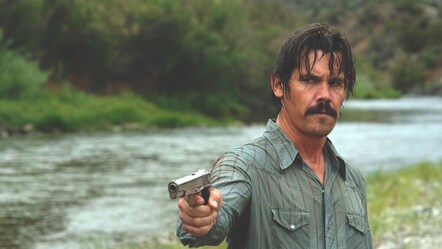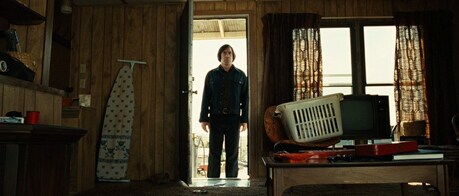A- | A man who finds a satchel of money in the desert is pursued by a deadly hitman. Directed by Joel and Ethan Coen Starring Josh Brolin, Javier Bardem, and Tommy Lee Jones Review by Jon Kissel |

Prime pursuer number one is iconic villain Anton Chigurh (Javier Bardem), a Terminator-esque hitman who may as well have a metallic endoskeleton. Introduced strangling the life out of a cop and using his signature bolt pistol on an unwitting driver, Chigurh is utterly implacable in his pursuits. His stripped-down philosophy is gradually revealed in interactions he has with bystanders and his quarry, wherein he views himself as an impartial angel of death with no patience for niceties or manners when there’s work to do. Chigurh is set after Moss and the satchel, but by pulling him into their orbit, his taskmasters subject themselves to his own form of morality, where a professional slight can warrant a visit from Chigurh’s silenced shotgun, his second trademark weapon.
Above the fray is Sheriff Ed Tom Bell (Tommy Lee Jones), a multi-generation lawman nearing his last days on the job. No Live-4-Ever walking trope, Sheriff Bell isn’t so excited about the end of his professional life, but resigned to a world that has gotten beyond his understanding. His lamenting of the modern criminal opens the film, and orients the viewer toward the knowledge that they are about to see some depravity. Sheriff Bell has seen enough depravity to last a lifetime. Always several steps behind Moss and Chigurh and a regular patron of a diner despite the swirling, high-casualty chase around him and his deputies, Sheriff Bell still radiates steadiness and goodness in a world that he claims has gone to pot, though contemporaries with a longer view doubt his certainty.
No matter the genre or the tone, it wouldn’t be a Coen Brothers movie without some kind of rumination on the unblinking, unfeeling universe and its human inhabitants who will go to great lengths to pretend otherwise. This is an evergreen theme for Joel and Ethan, recurring as well in The Man Who Wasn’t There, Burn After Reading, A Serious Man, and Hail Caesar. The smaller version of this theme, wherein a criminal thinks something is going to be simple and it goes a different way, dominated their first 20 years, until they finally blew it up to include religion and the cosmos. No Country isn’t the most explicit version (that’d be A Serious Man), but for a chase film, a surprising number of scenes are given over to an oblique discussion about inevitability and hubris.
Two of the three main characters represent different ways into this theme of fate and chance and people wanting to believe they have more control than they do. Moss is certain that he can get out from under Chigurh, if not kill him outright, keep the money, and go back to his wife. He ignores the hard-won advice of bounty hunter Carson Wells (Woody Harrelson) and chooses not to acknowledge all those close calls he escapes. He ignores the consideration that, for example, if a truck packed with gunmen pursuing him had found a patch of smooth prairie to drive on, he would’ve been shot and killed through no error of his own other than his impulse of conscience, and instead credits his escape through the river to his own talents, a miscalculation that keeps building up his pride until he’s sending Carla Jean to her doom with his own voice. The Coens treat Moss’ certainty with disdain, leaving his death offscreen and carried out by characters who aren’t named or have any lines save for a throwaway intel gather from Carla Jean’s mother. He thought that satchel was free and clear, but it had invisible strings attached to it that, when pulled, started the Rube Goldberg machine moving towards his impending bleeding out on a hotel carpet.

What complicates Chigurh’s story, and brings him down to Moss’ level, is how we leave the mop-topped assassin. After emerging utterly victorious such that he’s retrieved the satchel, killed the bosses who insulted him, and squared his perverse moral requirements by killing Carla Jean (he scraped his boots off as he was leaving… she’s dead), he’s hit by a car that runs a red light, leaving him with a compound fracture that will be much harder to fix in a bathtub than a measly shotgun wound in the thigh. Whether the car is the god of the movie giving this villain some comeuppance or if it’s just Chigurh getting a dose of randomness or something else entirely, the result is him prostrate in front of two teens, begging for a shirt. There’s a sequence in Benjamin Button where the film tracks all the events that had to happen to lead up to a car accident. All the little coincidences are interesting to consider, but they don’t change the fact that a character ends up splayed in the street at the end of it all. These kinds of coincidences are evident in a few frames, when Chigurh has lit the fuse on a car and is walking towards the camera in anticipation of the explosion. In the background, a man walks right past the car. If he had been delayed by a few seconds, he would have been incinerated. This extra’s presence is surely purposeful, and indicative of how fate doesn’t have to be negative: it can also prevent smoldering human remains smeared on a sidewalk. However, saying that implies a purpose, which is not something the film would endorse.
Watching all of this ineffectively is Sheriff Bell, who could easily be removed from the film and the plot mechanics wouldn’t be changed at all. Setting aside that he’s played masterfully by Jones and is therefore a perpetually welcome presence, No Country needs Sheriff Bell to make the film’s concurrent point. In his parts of the film, Bell is living up to the old saw about every generation being sure that the world is coming to an end, that the youth are ruining things, that things were better in some mythical past. His fellow sheriff buttresses this thinking, though he’s more concerned with hair dye than hotel massacres. It requires Ellis, a person older than Bell, to remind him that the world does not in fact change, that violence has always been a part of this region, if not the whole of human history. The constant, brutal nature of the species is a pet theme of McCarthy, and while it’s not the focus here, I would be surprised if any of the author’s work didn’t communicate this in one way or another.
Squaring the two thematic regions of No Country is probably a fool’s errand, as the Coen’s are also the type to entertain the idea of meaninglessness in things like complex, verbose movies that prompt a search for meaning. With Chigurh’s line about the coin going into the gas station attendant’s pocket, the arbitrary assignment of value is certainly present in No Country. However, I don’t think McCarthy is as into that kind of audience fuckery, so there must be something consistent in the film. Bell’s final dream contains another McCarthy trope about ‘carrying the fire,’ a phrase perpetually present in The Road. The person who says that in No Country is a force for order within a chaotic milieu, someone who would carve out oases where the Chigurh’s of the world don’t hold sway. Of course, so many bystanders are killed in No Country who are in the wrong place at the wrong time, so these oases are in fact mirages sustained by civility and manners, the exact things that Chigurh openly scoffs at.
The film might boil down to Bell’s opening monologue, specifically about how understanding what he perceives as the new viciousness in the world requires getting down into the muck with it, something he can’t abide. We later learn that he also can’t abide dwelling on old instances of violence that put the lie to his thinking, subconsciously rejecting countermanding evidence for a premise that, while not exactly comforting, does provide him with a muted sense of superiority. Being reminded of the truth of the world, which for No Country is that improvement is eternal and unfinished, that death is perpetual, that events out of your control are pushing you towards an end, is a hateful proposition, but ignoring it is as ridiculous as trying to tell Anton Chigurh that it’s closing time when it obviously is not. Instead, so many comforting lies about control and safety and competence distract us until we’ve forgotten that death has taken its shoes off and it won’t be heard coming.
I just wrote two reviews worth of pure theme rumination. No Country inspires that kind of consideration, but because the action and tension are so precise, it doesn’t need it. The Coens don’t really make these kinds of movies, preferring a comedic route on mostly everything. No Country demonstrates that they could’ve made a whole career out of taut thrillers because this is pretty much perfect in every aspect. Every decision by the Coens, who also edited the movie, or by legendary cinematographer Roger Deakins, or by Carter Burwell and his minimalist score is surprising in the moment and absolutely correct in retrospect. The main three actors are doing some of the best work of their careers, as is Harrelson and Macdonald and our old friend Garrett Dillahunt as one of Bell’s deputies. Quotable in its entirety and riven with small grace notes, it contains a mixture of competence porn alongside frantic desperation, thus demonstrating that expertise and know-how aren’t enough when the bullets are flying or have flown through one’s midsection. The whole thing’s unimpeachable.
No Country doesn’t get the full A+, however, for reasons that are more subjective than this whole subjective process. King of the Hill introduced me to the idea of wabi-sabi, a Japanese precept that a thing’s imperfections are what makes it beautiful. No Country is free of imperfections, and it’s therefore not beautiful in the way Coen/2007 counterparts like Inside Llewyn Davis, O Brother Where Art Thou, or Once are. If there’s one thing No Country’s missing, it’s passion, and I think that’s why I can acknowledge its unquestionable greatness while still holding it at the most minimal of lengths. No mistake, I love this movie, but I love it as much as a fundamentally bleak piece of work can be loved. A
 RSS Feed
RSS Feed